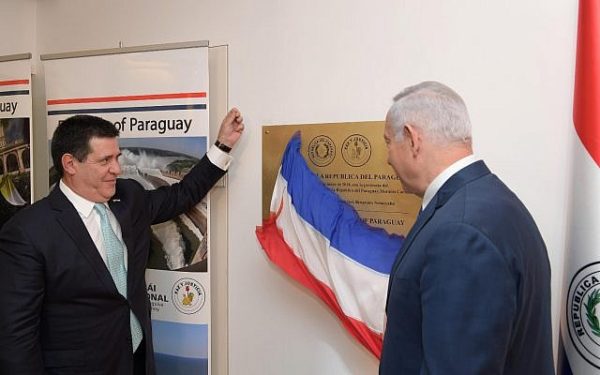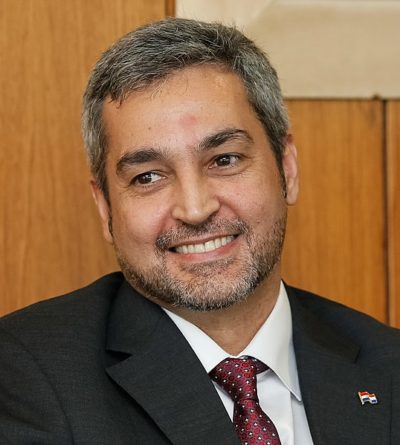In what can only be described as a petty act of petulance, Prime Minister Benjamin Netanyahu recently recalled Israel’s ambassador in Paraguay and closed the Israeli embassy in Asuncion. He made these rash decisions after Paraguay, in a dramatic reversal, moved its embassy in Jerusalem back to Tel Aviv. “Israel views with the utmost gravity the extraordinary decision by Paraguay, which will cloud bilateral relations,” Netanyahu said.

Equally shocked and disappointed by Israel’s drastic and surprising maneuver, Paraguay’s new president, Mario Abdo Benitez, correctly urged Netanyahu to reconsider. “I regret Israeli’s decision,” said Benitez, who’s of partial Lebanese origin. “The reaction of closing the (Israeli) embassy was a little exaggerated, and we urge authorities to reconsider it.”
Paraguay’s new foreign minister, Luis Alberto Castiglioni, judiciously argued that the issue of Jerusalem, one of “the most complex components” of Israel’s conflict with the Palestinians, should be addressed through negotiations by the concerned parties.

He is right, of course.
The diplomatic dispute between Israel and Paraguay erupted when Benitez’s predecessor, Horacio Cartes, in one of his last acts as president, unilaterally moved Paraguay’s embassy in Tel Aviv to Jerusalem.
Paraguay, a minor South American country, thus became the third country after the United States and Guatemala to do so. In a ceremony on May 21 in Jerusalem attended by a beaming Netanyahu, Cartes officially reopened Paraguay’s embassy in Israel’s capital.
Cartes, calling the event “historic,” said it was of “special significance because it expresses the sincere friendship and brave solidarity between Paraguay and Israel.” Netanyahu, hoping that Paraguay’s example would encourage more countries in Latin America and elsewhere to transfer their embassies to Jerusalem, described it as a “great day” for Israel and Paraguay and added, “We have no better friend than you.”

The problem is that Cartes acted after Benitez had already been declared the winner of Paraguay’s election this past April. Understandably upset by Cartes’ failure to consult him, Benitez disclosed he would review the matter. Being opposed to Cartes’ policy, Benitez was within his rights to switch course.
Unfortunately, Israel was caught in the crossfire of a domestic Paraguayan squabble, resulting in a setback to Netanyahu’s concerted campaign to gain further international recognition of Jerusalem as Israel’s “undivided” capital.

It goes without saying that Israel’s capital in West Jerusalem should be recognized internationally, but recognition should be postponed until Israel and the Palestinians sign a peace agreement ending their protracted dispute. Israel, which annexed East Jerusalem in 1967, cannot expect its annexation to be universally accepted.
And just because U.S. President Donald Trump recognized Jerusalem as Israel’s capital last December and unilaterally removed from the diplomatic agenda does not mean it has been taken off the table, as he falsely suggests.
This is the kind of unilateralism that very few nations will embrace.
The Palestinians deserve statehood in the West Bank and the Gaza Strip and are entitled to East Jerusalem as their capital.
As far as Paraguay is concerned, Netanyahu acted in haste and thoughtlessly when he angrily shuttered Israel’s embassy in Asuncion and ordered Israel’s ambassador to leave. He could have expressed his regrets and moved on, but instead he decided to teach Paraguay — one of Israel’s oldest friends — a lesson.
Has he forgotten that Paraguay was only one of 33 countries that voted for the 1947 United Nations Palestine partition plan? Special friends like that should be treated with respect, even in the case of a major disagreement. In the meantime, the PA and Turkey took advantage of the situation to announce plans to open an embassy in Asuncion, leaving Israel out in the cold.
Certainly, Israel did not lash out at Colombia, a major Latin American state, when it blindsided Israel and recognized Palestine as a sovereign state on August 9. Netanyahu’s mild reaction was to abruptly cancel a trip to Colombia to attend the inauguration of its new president, Ivan Duque.
U.S. Vice President Mike Pence only added oil to the fire by phoning Benitez and exerting pressure on him to honor Cartes’ misconceived decision. It was the kind of blatant intervention that was completely unwarranted and contrary to Israel’s interests in a region that does not take kindly to American meddling.
